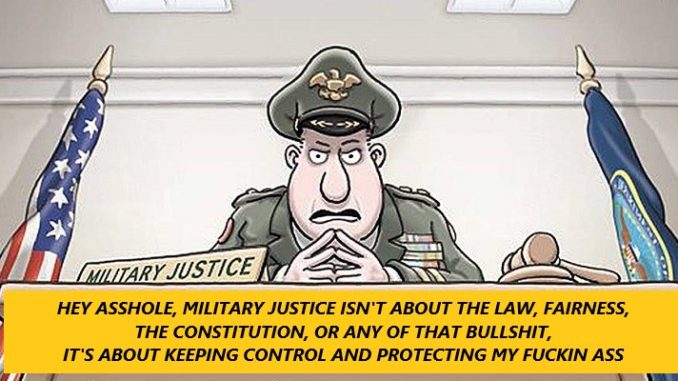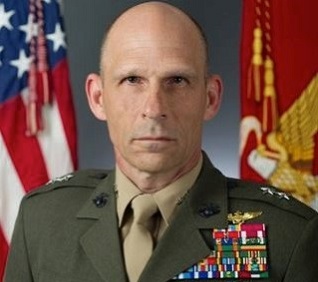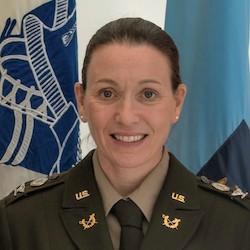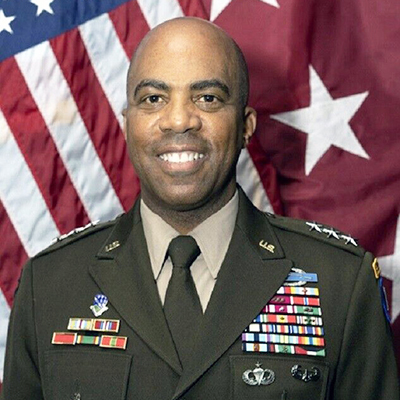
Unlawful command influence (UCI) is a never-ending problem that unrelentingly plagues the military judicial system. It happens more often than anyone knows. Many people are serving long prison sentences because of UCI’s pervasive presence in military trials. Even though it’s quite illegal, it continues unabated in each branch of service, especially the United States Navy.
Here we discuss the United States Army and how they use UCI to “get even” with people they don’t like.
BEFORE DISCUSSING IT, WE HAVE TO DEFINE IT!

Unlawful command influence (UCI) occurs when a person bearing “the mantle of command authority” uses or appears to use that authority to influence the outcome of military judicial proceedings against the accused.
Military commanders typically exert significant control over their units, but under the Uniform Code of Military Justice (UCMJ) a commander must take a detached, quasi-judicial stance towards disciplinary proceedings such as court-martials.
Outside of certain formal actions authorized by the UCMJ, a commander using their authority to influence the outcome of a court-martial commits UCI. If UCI has occurred, the results of a court-martial may be legally challenged. Seldom are their challenges and when there are, seldom are cases overturned.
Because the convening authority placed his/her thumb on the scales of justice, innocent people are railroaded right into prison. A large percentage are found guilty of things that normally would garner 1-3 months in jail, but the insidious presence of UCI generally results in terrible over-sentencing.
Instead of three months, the accused got five years in prison. Colonel Dan Wilson was sentenced to 5 1/2 years for a crime he never committed thanks largely to a corrupt Marine court and overwhelming presence of UCI.
And who can forget the travesty of justice involving Senior Chief Special Warfare Operator (SEAL) Keith E. Barry? UCI was introduced into his case by the top JAG officer of the United States Navy, Vice Adm. James W. Crawford, III.
And lest we forget, how about all the convening authority, along with the judges and lawyers involved in the railroading of Air Force Major Clarence Anderson III. Major Anderson served his entire sentence because the military needed heads on a platter to serve up to a WOKE Congress.
And, what about Lt. and JAG officer Virginia Kelley? The Navy tried to railroad her right out of the Navy on trumped up charges.
Or, how about Major and JAG officer Erik Burris who is now serving time in prison because he came to the defense of the accused. He didn’t get the memo; the Army wanted a conviction, not an exoneration. They don’t care about truth and facts, they just wanted a notch in their gun belts.
There are countless stories and never any accountability for those who perpetrate unlawful command influence. The military, especially the Navy just gives it a wink and a nod and it’s back to business as usual.
WHOOPS, YOU GOT A SKIN-LETTER

During World War II, mass mobilization resulted in an unprecedented proportion of the US population serving in the armed forces.
Over two million courts-martial were performed under the then-governing “Articles of War.”
Consequently, a large portion of the American population was exposed to the military’s style and abuse of justice.
The reaction of people who were targets of it was obviously not positive.
And, the majority of others that were mere witnesses also had negative reactions.
The public and Congress perceived the “Articles of War” granted way too much authority to commanders who terribly misused their power with harsh and arbitrary results.
If you can believe it, some commanders would issue reprimands called “skin letters” to jury members of courts-martials who had been, in their opinion, way too lenient on the accused.
The person who received a so-called “skin letter of reprimand” could forget about a career in the military.
Otherwise excellent military careers went in the toilet because they did not provide the convening authority his/her pound of flesh. The pressure on jurors to drop the hammer on the accused was enormous. Eventually, the “skin letters of reprimand” went underground, but never went away.
In an effort to curb this outrageous and illegal behavior by military officers, Congress enacted the Uniform Code of Military Justice (UCMJ) in an attempt to infuse a civilian form of due process into the military justice system, while at the same time maintaining the unique authority of the commander.
Keep in mind the UCMJ was written of the military, by the military, for the military who craftily hid their bias against any accused now threaded in a veil of deceitfully blended words that provided Congress some “fair and balanced” cover with the American people.
Under the new UCMJ system, commanders retained significant formal powers over the military justice system. They refer charges to courts-martial, chose subordinate jurors from their own chain of command. This was a major flaw! The convening authority is writing/approving the officer fitness reports/OERs on each member of the jury.
Sometimes, before the court martial even begins, the juror is approached in a casual setting by someone acting as an emissary for the convening authority saying, “Captain, you’ve got a great career going here, don’t blow it!” The juror immediately feels the heat coming from the admiral/general who can destroy his career with the mere whisp of his/her pen.
When the military has their own little courts, their own little judges, their own little prisons and jurors that can be easily intimidated by the convening authority, what can go wrong?
UCMJ ARTICLE 37
Courts-martials are now presided over by military judges, and commanders are specifically directed to remain detached from the proceedings through Article 37 of the UCMJ. Seldom to the commanders “remain detached.” Again, the military had to address the issue so they wrote an article in the UCMJ to give the appearance the military justice system is fair and balance.
Article 37 of the UCMJ is the statutory basis for unlawful command influence. It states, in part:
(a) No authority convening a general, special, or summary court-martial, nor any other commanding officer, may censure, reprimand, or admonish the court or any member, military judge, or counsel thereof, with respect to the findings or sentence adjudged by the court, or with respect to any other exercises of its or his functions in the conduct of the proceedings. No person subject to this chapter may attempt to coerce or, by any unauthorized means, influence the action of a court-martial or any other military tribunal or any member thereof, in reaching the findings or sentence in any case, or the action of any convening, approving, or reviewing authority with respect to his judicial acts.
Courts have devised a complex test to sift cases for UCI. First, courts require that the defense produce some evidence to support an allegation of UCI. This is very difficult, because threats of retribution by the convening authority is never written down. Military commanders learned from civilian leaders the fine art of plausible deniability.
If, the command was unbelievably careless by inadvertently providing evidence of unlawful command influence, responsibility shifts from the defense to the government to persuade the court, beyond a reasonable doubt, that the UCI did not prejudice the accused. The government could show…
- the underlying facts did not occur,
- the facts do not constitute improper influence, or
- if there was UCI, it did not prejudice the defendant
The fact of the matter is the entire system was set up to provide all power to the convening authorities. They can do whatever the hell they want to do, that’s why innocent people are railroaded into military prisons all the time. That’s why a large percentage of those behind bars were horribly over-sentenced.
COLONEL KRISTY RADIO
Here’s an excellent example of how UCI permeates and corrupts the system…
The blog for the Court of Appeals of the Armed Forces (CAAF) recently broke a story on the next UCI scandal: https://www.nimj.org/caaflog/the-next-uci-scandal#/comments.
Here is the back story of the Sergeant Carmen Ironhawk Scandal. During an ongoing murder trial at Fort Bliss, TX, home of the 1st Armored Division (1AD).

When the military judge approved a delay in the trial date, the 1AD Staff Judge Advocate, Colonel (COL) Kristy Radio, sent emails to the Office of the Judge Advocate General Criminal Law Division and to the Chief Judge of the U.S. Army.
She expressed her “disappointment” on behalf of the chain-of-command and attempted to have the judge removed.
COL Radio’s thinly veiled expression of the command’s wishes creates the appearance of unlawful command influence.
Contacting a judge’s superior during the trial to remove the sitting judge and achieve an intended result undermines justice. Yes, the problem of UCI still exists because senior commanders severely lack personal honor.
You can find the associated documents related to this event on CAAFlog. The Army Court of Criminal Appeals recently denied the Government’s petition against the judge, by the way: https://www.nimj.org/caaflog/ironhawk-decision-by-acca#/.
Let’s set the Ironhawk Scandal aside for now and we’ll get back to COL Kristy Radio later.
Remember Major (MAJ) Andrew Higgins? He served in the 25th Infantry Division (25ID) in Hawaii several years ago. Major Higgins provided evidence of malfeasance to MilitaryCorruption.com.
Major Higgins and his wife was subsequently escorted off the base and out of the service with an Other-Than-Honorable (OTH) Discharge. (formerly; Undesirable Discharge)
Military police came to his on-base housing one night and told him and his wife to pack up their shit, they were to be escorted off the base immediately.
That’s when Major Higgins discovered the infamous Major General Ronald Clark had administratively kicked him out of the Army with an OTH. https://militarycorruption.com/ronald-clark/.
COLONEL TERRI ERISMAN
The 25ID Staff Judge Advocate at the time was COL Terri Erisman. She assisted the command in “navigating” (i.e., covering up) the issues that were at the core of various administrative investigations.
Her manipulations proved so successful that she was invited to the JAG School to teach her techniques for “Managing Complex Investigations” to those who had been selected to fill the next slate of Staff Judge Advocate and Deputy SJA positions across the Army.

Although the slides from the link above lack detail, you can see Erisman’s philosophy of “play the long game” and the conceited belief that the “SJA is the one person on the staff who knows every aspect” of an investigation.
Neutral and impartial officers are supposed to conduct administrative investigations, but Terri Erisman charges SJAs to “ensure legal advisors know this is not a spectator sport.”
In the 25ID Office of the Staff Judge Advocate, attorneys were actively and heavily involved in editing investigation reports, essentially ghostwriting them into products that would serve the command.
Erisman advises keeping “findings short and concise.” Mind you, this is not because she has a stylistic preference for brevity but because a shorter statement makes it harder for the investigation’s subject to challenge the findings.
In the case of MAJ Higgins and others like him, a truncated findings statement reduced the chances of finding flaws in the investigation and contesting its results. Subjects were left with no option for recourse.
Erisman later wrote in The Army Lawyer, the Army JAG Corps’ professional journal. HER ARTICLE was essentially a victory lap aimed at MAJ Higgins and those like him providing a blueprint for dealing with Soldiers’ complaints. Actually, a blueprint for dealing with whistleblowers.
According to Erisman, the key to success is to label Soldiers’ grievances “toxic complaints” and then use the investigative process to turn the tables against them. As she put it, “In the end, what you are creating is your command’s and, in many cases, the Army’s record of what happened.”
During Erisman’s tenure, her office was notorious for the wholesale rewriting of investigating officers’ reports to ensure the resulting findings were favorable to the command. And, these are the kinds of officers who are promoted right to the top for flagrantly ignoring the law and the spirit and intent of the law.
ARMY REWARDS ILLEGAL MISCONDUCT

After keeping the commanding general’s record blemish-free at 25ID, Erisman was rewarded with a position as the Executive Officer to the Judge Advocate General, essentially the gatekeeper to the head of the Army’s legal enterprise.
The division’s commanding general also moved upward. He pinned on a third star and is now Lieutenant General Ronald Clark, the Senior Military Assistant to the Secretary of Defense.
Clark is the one, by the way, that concealed the hospitalization of SECDEF. Normally the fix-it man for the Army, but that one blew up in his face.
Now let’s return to the Ironhawk Scandal.
COL Kristy Radio, accused of manipulating the legal system to benefit the chain of command, was the Deputy Staff Judge Advocate in 25ID.
Radio was COL Erisman’s protegee, eager right hand, and accomplice in all the ethically questionable behavior that took place during that time. Radio was rewarded with a promotion and several key assignments in Washington, DC, and is now a Division-level Staff Judge Advocate.
As for Radio’s former boss and mentor? Terri Erisman moved up as well to become one of only three Corps-level SJAs in the Army and on the shortlist for general officers in the JAG Corps.
Terri Erisman is the Staff Judge Advocate for III Corps and Fort Cavazos, which makes her the higher-level SJA and technical chain supervisor to…COL Kristy Radio at 1AD. When it comes to unethically manipulating the legal system to the chain of command’s advantage, it seems that the apple doesn’t fall far from the tree.
NOTE: If you feel you have been wrongfully maligned by anything in this article, send us your rebuttal. If your rebuttal conflicts in stark terms with information we have received, we may ask for a sworn statement that we are glad to publish.
If you are a witness and have important information for our readers to consider, send us your information without embellishment immediately.
The military judicial system is in dire need of reform. They know it and so do we.
